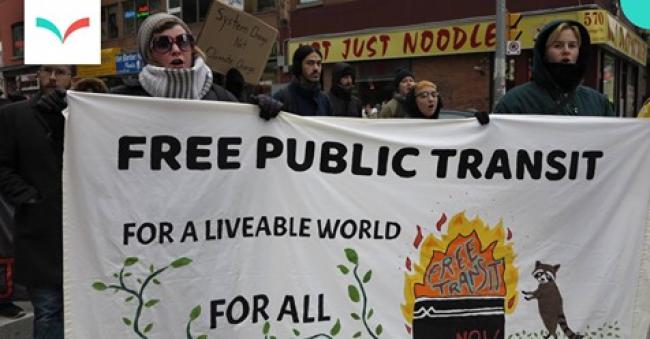Articles Menu

They entered the station without paying, then jumped the barriers and held them open for other passengers to go through.
Around 20 climate justice activists in Toronto flooded into Osgoode station, the subway station closest to City Hall, on Nov. 29, filling it with a chant: “Public transit should be free! Liberate the TTC!” The Toronto Transit Commission operates buses, subways, streetcars, and light-rail vehicles in the city.
With an action reminiscent of a wave of recent protests from Santiago, Chile, to New York City, Toronto has joined the rank of cities using fare strikes and evasion to push for a transition to an environmentally sustainable economy that relies less on fossil fuels.
“There was this very pregnant 10 seconds where we’re hearing the TTC operators say, ‘Okay, doors are closing, please do not stand in the way of the doors,’” said Joey, who participated in the fare evasion.
“Then the train was off,” said Joey, “and there were cheers throughout the train,” including from passengers not associated with the group. “Nobody was scowling.”
Joey told Ricochet he was surprised at how broadly supported the fare evaders were by the passengers.
The fare evasion happened after Toronto’s climate march, coordinated by the Toronto chapters of the international environmentalist groups Fridays for Future and Extinction Rebellion.
A crowd of climate justice advocates and their supporters had rallied in front of the provincial parliament building at 11:30 a.m. to demand climate action. Central to the crowd’s demands was the idea of a just transition — a transition to a green economy that “takes into account every community, and doesn’t leave anyone behind,” one climate march participant told Ricochet.
For advocates of free transit, the date of Nov. 29 is symbolic for a few reasons.
The fare evasion was a response to the TTC’s phasing out of tokens, slotted for Nov. 30.
“A lot of people can’t afford the TTC, especially considering the prices keep rising. The fact they’re getting rid of tickets and tokens and it’s only PRESTO now,” said Dakota, referring to the infamously glitchy universal transit card for the Greater Toronto Area.
“A lot of high school students only take the bus because they can get tickets from school. How are they going to get to and from school and get their education if tickets aren’t available to them? We want a generation that’s educated, who knows what they’re going to do their lives. How can they do that if they can’t afford to even go to school?”
The action was also a response to #NobodyPays, a call for fare strikes that was put forth by an alternative publication in Portland and has gained traction throughout North America. Fare strikes have become an increasingly popular method of protest since university students in Santiago, Chile, first used them on Oct. 7, 2019, to protest fare hikes, sparking a wave of protests across the country.
On Nov. 1, 2019, almost a thousand people in New York jumped over transit turnstiles in response to police brutality against Adrian Napier, an unarmed Black teen who was tackled to the ground and frisked by multiple NYPD officers, who also drew their guns in the station.
In Hong Kong, protestors have also used fare evasion in their ongoing fight against repression by Beijing.
The TTC has controversially allotted funding to an increased number of fare inspectors rather than to subsidies that would make transit more accessible to people.
“Fares target the poor and marginalized communities unfairly, because … if the fare evasion police have biases against marginalized communities, that’s going to be played up in who they target with tickets,” said another person who participated in the Osgoode station evasion.
None of the protesters were detained or arrested.